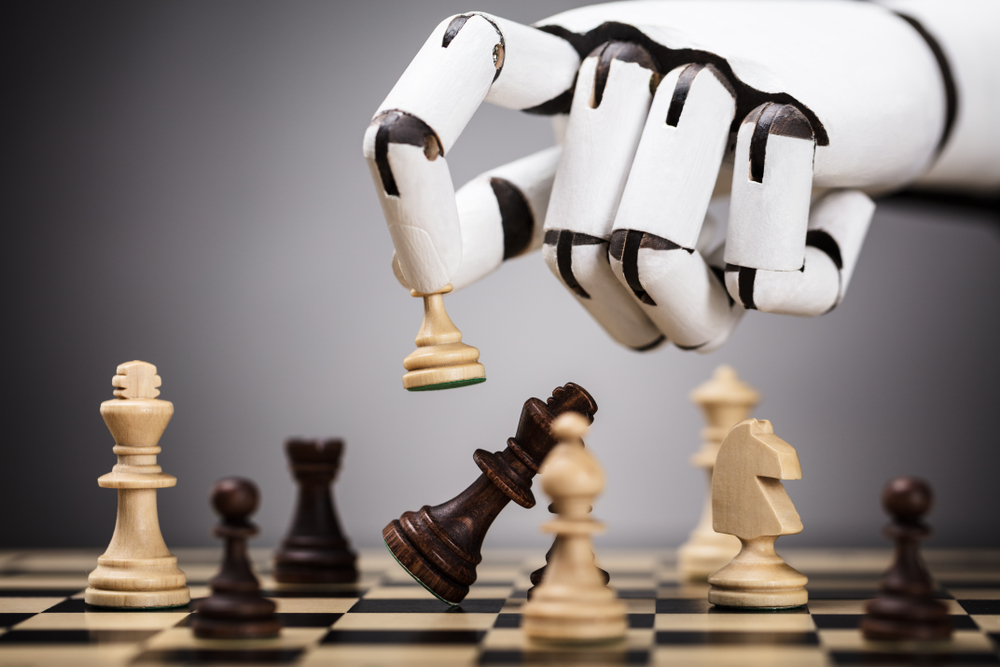A question of code and ethics

John E. Kaye
- Published
- Executive Education, Home, Technology, Uncategorized


The more influence AI asserts across the industrialised world, the more emphasis we must place on ethics and education, says Professor Andreas Kaplan of ESCP Business School
Artificial Intelligence (AI) is defined as a system’s ability to correctly interpret external data, to learn from such data, and to use those learnings to achieve specific goals and tasks through flexible adaptation. The technology is leading to significant changes in today’s world, with huge shifts in employment markets due to more jobs being automated. Many if not all employees will have to acquire new skills if they do not want to be replaced by a machine.
On an international scale, AI might lead to a new world order, with China and the US fighting a tech cold war in which Europe is not even part of the picture. Regulation, international cooperation and diplomacy will aim to remedy negative effects. In this scenario, two areas will be of particular importance: ethics and education.
Ethics for a better world
First, an AI system will do whatever task it has been ordered to do – even if these tasks are unethical, illegal or lead to negative outcomes. Obviously, this is highly problematic and hence requires strict regulation and laws. However, there is a second, more complicated issue related to ethics and AI: humans are often imprecise in their commands, which might lead to misinterpretations and counterproductive outcomes. An AI system which is tasked with protecting the US president could simply lock him in the Oval Office. He is indeed protected, but that was not what was ™傱 intended in the first place. To perform as desired, AI systems need to have some understanding of human values and ethics to enable them to correctly interpret fuzzy commands. We will need to develop ethical guidelines and consequently implement them within AI-driven systems. This might not sound urgent right now, but as AI becomes more powerful and capable in the future, the need for ethics will become more important.
Third, AI systems are trained to learn from data. If this data is already biased, the error will be formalised and potentially amplified by AI. In the corporate world, an increasing reliance on AI will make existing company rules and actions more accentuated. If, for example, your company previously had a small bias toward hiring a certain type of applicants, then the newly introduced AI system will go all the way. This is what happened to Amazon, which had to discontinue a recruiting tool that systematically favoured male candidates.
Ethical behaviour can certainly be enforced or at least strengthened by regulations and guidelines. However, when regulators apply AI themselves, this discussion becomes all the more important. Today, China already broadly embraces AI in order to track and monitor its citizens. The Chinese government is collecting big data on individuals from a variety of sources, then using it to calculate an individual’s “social credit score”, which is intended to incentivise lawful behaviour and good citizenship. The score goes up for good behaviour, such as donating blood, or down, for example when getting a speeding ticket. Loan approvals, hiring decisions, and the like, are all based on the citizen’s score.
Education for a new world
The fact that ethical leadership becomes an imperative will also impact the educational system. Teaching ethics in schools, universities, and business schools will become crucial. Topics such as the combination of artificial intelligence and humanities may become as important as mathematics or geography. Courses on such topics should be taught to everyone, independently of the area of studies they focus on. But this is not the only domain where (higher) education will have to evolve, and as Rector and Dean of ESCP Business School, I constantly question myself on how to prepare the future generations for the changes to come.
Currently, curricula are created as if the world has barely changed. Surveys recurrently show that employers do not think career readiness is linked to academic achievement. However, for the moment, this is a rather subjective opinion and rarely supported by hard facts. Yet, in an AI-equipped workplace based on big data, such claims could rapidly become objective when linking job performance to academic achievements, extracurricular activities, or course attendance. This could help universities and business schools around the world to revise both contents and pedagogy.
What skills will be needed in a world of AI which we only know little of today? Adaptability to new contexts and an entrepreneurial mindset are certainly useful. An appetite for lifelong learning as well. Basic knowledge in programming and data analytics will prepare future collaborations between people and machines – just like it helps to know some words in Chinese when working with China. Social skills and social perceptiveness are definitely part of this list, since they make employees less likely to be replaced by AI-powered robots. Managers will need to adopt an open, human, and highly ethical leadership style that generates confidence in employees who might be afraid of losing their jobs. Successful managers of the future will need to act as empathetic mentors and data-driven decision-makers at the same time.
Yet, to make room for such courses in students’ weekly timetables, others will have to be scratched. And those might not be the ones you would think of first. Why should one learn mathematics, if AI can do it faster and better anyway? If it is to train the brain to think in a structured way, or to enhance cognitive processing power, there might be better ways of achieving the same goal. Higher education needs to reflect upon this. Efficient 21st century education should be built upon the hypothesis of the human-machine symbiosis and focus on skills that will really be needed.
Staying in control
Given the many uncertainties surrounding AI, its future development and potential, it is not surprising that the viewpoints on it range from outright alarmist, as often expressed by Elon Musk, to euphoric, like the vision of inventor and best-selling author Raymond Kurzweil. Stephen Hawking called AI “either the best or the worst thing ever to happen to humanity”. Without a crystal ball it will be impossible to see where, when, and how artificial intelligence will evolve, and in how far it will change the world. However, in order to evolve towards a peaceful world where humans stay in control, ethics and education certainly have a major role to play. ν
Further information
RECENT ARTICLES
-
 Deepfake celebrity ads drive new wave of investment scams
Deepfake celebrity ads drive new wave of investment scams -
 Europe eyes Australia-style social media crackdown for children
Europe eyes Australia-style social media crackdown for children -
 Europe opens NanoIC pilot line to design the computer chips of the 2030s
Europe opens NanoIC pilot line to design the computer chips of the 2030s -
 Building the materials of tomorrow one atom at a time: fiction or reality?
Building the materials of tomorrow one atom at a time: fiction or reality? -
 Universe ‘should be thicker than this’, say scientists after biggest sky survey ever
Universe ‘should be thicker than this’, say scientists after biggest sky survey ever -
 Lasers finally unlock mystery of Charles Darwin’s specimen jars
Lasers finally unlock mystery of Charles Darwin’s specimen jars -
 Women, science and the price of integrity
Women, science and the price of integrity -
 Meet the AI-powered robot that can sort, load and run your laundry on its own
Meet the AI-powered robot that can sort, load and run your laundry on its own -
 UK organisations still falling short on GDPR compliance, benchmark report finds
UK organisations still falling short on GDPR compliance, benchmark report finds -
 A practical playbook for securing mission-critical information
A practical playbook for securing mission-critical information -
 Cracking open the black box: why AI-powered cybersecurity still needs human eyes
Cracking open the black box: why AI-powered cybersecurity still needs human eyes -
 Tech addiction: the hidden cybersecurity threat
Tech addiction: the hidden cybersecurity threat -
 Parliament invites cyber experts to give evidence on new UK cyber security bill
Parliament invites cyber experts to give evidence on new UK cyber security bill -
 ISF warns geopolitics will be the defining cybersecurity risk of 2026
ISF warns geopolitics will be the defining cybersecurity risk of 2026 -
 AI boom triggers new wave of data-centre investment across Europe
AI boom triggers new wave of data-centre investment across Europe -
 Make boards legally liable for cyber attacks, security chief warns
Make boards legally liable for cyber attacks, security chief warns -
 AI innovation linked to a shrinking share of income for European workers
AI innovation linked to a shrinking share of income for European workers -
 Europe emphasises AI governance as North America moves faster towards autonomy, Digitate research shows
Europe emphasises AI governance as North America moves faster towards autonomy, Digitate research shows -
 Surgeons just changed medicine forever using hotel internet connection
Surgeons just changed medicine forever using hotel internet connection -
 Curium’s expansion into transformative therapy offers fresh hope against cancer
Curium’s expansion into transformative therapy offers fresh hope against cancer -
 What to consider before going all in on AI-driven email security
What to consider before going all in on AI-driven email security -
 GrayMatter Robotics opens 100,000-sq-ft AI robotics innovation centre in California
GrayMatter Robotics opens 100,000-sq-ft AI robotics innovation centre in California -
 The silent deal-killer: why cyber due diligence is non-negotiable in M&As
The silent deal-killer: why cyber due diligence is non-negotiable in M&As -
 South African students develop tech concept to tackle hunger using AI and blockchain
South African students develop tech concept to tackle hunger using AI and blockchain -
 Automation breakthrough reduces ambulance delays and saves NHS £800,000 a year
Automation breakthrough reduces ambulance delays and saves NHS £800,000 a year



























